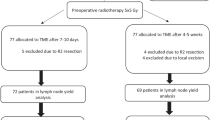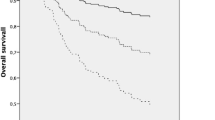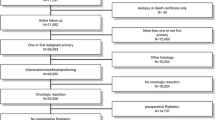Abstract
Background
The purpose of the study was to evaluate the prognostic value of metastatic lymph node ratio (LNR) in node-positive rectal cancer.
Methods
A retrospective review was performed in 318 rectal cancer patients who received curative anterior resection in a single institution. Clinicopathological variables including LNR were studied in univariate and multivariate analyses by Cox regression. LNR was further studied when stratified by quartiles. Survival analyses were performed using the Kaplan–Meier method and log-rank test.
Results
With median follow-up of 41 months, the 5-year disease-free survival (DFS) rate, overall survival (OS) rate, and local recurrence (LR) rate were 56.82%, 59.8%, and 11%, respectively. Multivariate analysis revealed that LNR as a continuous variable was the most significant prognostic factor for DFS, OS, and LR. On quartiles, LNR was stratified into three groups: <0.14, 0.14–0.49, and 0.5–1. The 5-year DFS rate was 72.57%, 58.54%, and 34.75% (P = 0.0001) and the 5-year OS rate was 72.19%, 61.92%, and 38.47% (P = 0.002) in the three groups, respectively. Five-year LR rate was significantly higher with LNR between 0.14 and 1 (3.6% in LNR<0.14 versus 15.6% in LNR 0.14–1, P = 0.019).
Conclusions
LNR is an important prognostic factor for node-positive rectal cancers. With a cutoff of 0.14 and 0.5, node-positive rectal cancer patients could be categorized into three subsets with significant different outcomes.



Similar content being viewed by others
References
Bando E, Yonemura Y, Taniguchi K, et al. Outcome of ratio of lymph node metastasis in gastric carcinoma. Ann Surg Oncol 2002; 9:775–84
Voordeckers M, Vinh-Hung V, Van de Steene J, et al. The lymph node ratio as prognostic factor in nodepositive breast cancer. Radiother Oncol 2004; 70:225–30
Herr HW. Superiority of ratio based lymph node staging for bladder cancer. J Urol 2003; 169:943–5
Berger AC, Watson JC, Ross EA, et al. The metastatic/examined lymph node ratio is an important prognostic factor after pancreaticoduodenectomy for pancreatic adenocarcinoma. Am Surg 2004;70:235–40;discussion 240
Berger AC, Sigurdson ER, LeVoyer T, et al. Colon cancer survival is associated with decreasing ratio of metastatic to examined lymph nodes. J Clin Oncol 2005; 23:8706–12
Sarli L, Bader G, Iusco D, et al. Number of lymph nodes examined and prognosis of TNM stage II colorectal cancer. Eur J Cancer 2005;41:272–9
Nitti D, Marchet A, Olivieri M, et al. Ratio between metastatic and examined lymph nodes is an independent prognostic factor after D2 resection for gastric cancer: analysis of a large European monoinstitutional experience. Ann Surg Oncol 2003; 10:1077–85
Marchet A, Mocellin S, Ambrosi A, et al. The prognostic value of N-ratio in patients with gastric cancer: validation in a large, multicenter series. Eur J Surg Oncol 2008;34:159–65
Slidell MB, Chang DC, Cameron JL, et al. Impact of total lymph node count and lymph node ratio on staging and survival after pancreatectomy for pancreatic adenocarcinoma: a large, population-based analysis. Ann Surg Oncol 2008;15:165–74
Lee HY, Choi HJ, Park KJ, et al. Prognostic significance of metastatic lymph node ratio in node-positive colon carcinoma. Ann Surg Oncol 2007;14:1712–17
Schumacher P, Dineen S, Barnett C Jr, et al. The metastatic lymph node ratio predicts survival in colon cancer. Am J Surg 2007;194:827–31; discussion 831–2
Kodera Y, Yamamura Y, Shimizu Y, et al. Lymph node status assessment for gastric carcinoma: is the number of metastatic lymph nodes really practical as a parameter for N categories in the TNM classification? J Surg Oncol 1998; 69:15–20
Inoue K, Nakane Y, Iiyama H, et al. The superiority of ratiobased lymph node staging in gastric carcinoma. Ann Surg Oncol 2002; 9:27–34
Wichmann MW, Muller C, Meyer G, et al. Effect of preoperative radiochemotherapy on lymph node retrieval after resection of rectal cancer. Arch Surg 2002;137:206–10
Baxter NN, Morris AM, Rothenberger DA, et al. Impact of preoperative radiation for rectal cancer on subsequent lymph node evaluation: population based analysis. Int J Rad Oncol Biol Phys 2005;61:426–31
Author information
Authors and Affiliations
Corresponding author
Rights and permissions
About this article
Cite this article
Peng, J., Xu, Y., Guan, Z. et al. Prognostic Significance of the Metastatic Lymph Node Ratio in Node-Positive Rectal Cancer. Ann Surg Oncol 15, 3118–3123 (2008). https://doi.org/10.1245/s10434-008-0123-8
Received:
Revised:
Accepted:
Published:
Issue Date:
DOI: https://doi.org/10.1245/s10434-008-0123-8




